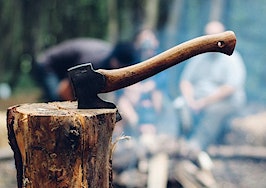Real estate’s next wave of experts are tackling this important question: How do you grow your team in a consumer-first real estate world?
I run a team in Phoenix-Scottsdale, Arizona. IBuying has been here for four years, and it has found a comfortable place in our ecosphere at just under 7 percent of the marketplace. IBuyers sold 493 homes out of the 7,793 sales through MLS in the Arizona Regional Multiple Listing Service for December, according to The Cromford Report.
Let’s look at how to win the other 93 percent of the consumers who are not being served by iBuyers.
We are going to compare growing a real estate team to attending a sporting event. I want to evaluate the customer experience like the time-honored experience of attending a baseball game.
Pulling out all the stops
There’s significantly more to serving the consumer when attending a baseball game at the professional level. Due to the slow pace of the game, there are lots of opportunities to improve the customer experience, just like in real estate.
Let’s take a look at Petco Park in San Diego, which some consider to be the best ballpark in baseball. (Being the best is also a claim many agents and teams make in this market.)
The customer experience at Petco Park is defined by the quality of food vendors, craft beer options and pre-game entertainment. There are also the activities between innings — the fireworks, the Swinging Friar mascot of the San Diego Padres, a 50/50 raffle, the spotlights of fans on the jumbotron and America’s finest whizzing overhead in close to billion-dollar aircraft. Also, let’s not forget the national anthem, belted out by a local star.
What does a real estate team’s comparative customer experience need to look like?
Many already do it at the highest level, and it evolves into the cornerstone of their brand, as is the case with The Matt Laricy Group, an elite Chicago-based real estate agency. Agents show up early to turn on the lights and are professionally dressed in suits.
Some teams even serve food and champagne to attract agents and clients. They also consistently show up to provide seller representation and explain every detail of a listing. Sometimes, they’ll even provide dedicated parking spots for clients visiting the office or send them cupcakes on their birthdays.
We go to great lengths to outshine our competition. We even bring toys for the kids to play with at closing, while the team transaction coordinator vets the closing documents before clients’ arrival.
All of this would be difficult for a single agent to manage, but it’s necessary for a team to compete at the highest level. Teams should adopt some, if not all, of these measures if they want more referrals.
Leveraging our expertise in a scientific way
In baseball, Ted Williams of the Boston Red Sox set the bar by which all others are measured. As a two-time American League MVP and Triple Crown winner, he defined hitting excellence. His on-base percentage was almost .500 and rarely would he swing at balls outside the strike zone, to the delight of those watching. In fact, in 1970, he even wrote a book called The Science of Hitting.
As ESPN explains, “the book included his now famous breakdown of the strike zone, using different colored baseballs to demonstrate what a hitter’s expected batting average would be if they swung at pitches in those locations.”
How does that translate to real estate? What is the science behind being a top producer? It’s harder to measure agent performance and break it down into expected averages, in a way that other agents can replicate.
Zillow is taking a stab at measuring agent performance by conducting consumer opinion surveys. It’s a step in the right direction but could have unintended consequences.
Homesnap was squeezed by the industry when it posted homeselling stats online years ago. Wanting to keep their agent clients, the platform made a decision to remove the revealing numbers. But don’t consumers deserve to see how many homes we sell and what we sell them for? Shouldn’t we reveal our true expertise? Or even the percentage we listed versus what we actually sold in the past 12 months?
How about brokers sending reviews to everyone we sold houses to in the past 12 months, and using them to help the agents provide a better customer experience?
Brokers run a different business, working with hundreds of agents. In contrast, smaller elite teams can adapt and improve their services in response to this kind of customer feedback more quickly. This, in turn, will end up as a positive feedback loop, resulting in increasing sales revenues, service improvement and more lead conversation.
The next huge wave of change, I believe, will be the team evolution of real estate expertise and science at every phase of real estate. I’m not talking about knocking on doors or prospecting techniques like cold calling, as those benefit real estate agents more than consumers.
I’m referring to the real estate expertise that can be gained from visiting 50 to 70 homes a month without the client, what we commonly refer to as previewing. But then you visit some of those homes with a client after you have already been in them. This cultivates your ability to become a “home expert.”
Some real estate agents will evolve into fixer-upper experts, and they’ll come to understand various kinds of return on investments they can get on certain kinds of improvements. Some elite teams, including mine, are already doing this.
On the buy side, teams will expand to become expert home finders, being able to identify those who want to move, but haven’t yet listed their property. Expert teams will be able to match those kinds of sellers to potential buyers who want to move into that neighborhood.
Yes, this is time-consuming, but again, teams have resources and leverage. Individual agents are too busy or lack the volume to develop the expertise.
Let’s be honest with ourselves, agents have been selling houses for 100 years. Why are we not experts on houses — our product? After attending hundreds of inspections and being inside over 15,000 houses, I believe this expertise can be developed.
Being experts on housing and housing valuation
Experienced agents can tell a homeseller who has wrapped a room with designer furniture that they’ve forfeited space, making their property feel smaller and, therefore, less valuable. The real expert also knows whether replacing an air conditioner on its last legs will get a seller the desired bump in home price or not.
This is more difficult than what an individual agent can deliver. It’s why teams flourish. It requires constant house visitations to understand differentials between prices ranges, especially in appreciating and depreciating prices, neighborhoods and the builder construction technique differences or materials.
Why can we not articulate that we understand prices better than the Zestimate? For goodness’ sake, we actually visit the homes, don’t we?
The Zestimate is an average, and as professionals, we understand the functional obsolescence that keeps the house from reaching that valuation, or sometimes lack of functional obsolescence, in which case it then sells for more.
If we can learn anything from Ted Williams, expertise developed through repetition is the major advantage teams have as specialists and not generalists. The volume that teams deal with would strain the average individual agent. The process simply presents them with too many tasks.
Jeff Sibbach leads The Sibbach Team at eXp Realty. He is based out of Phoenix.









